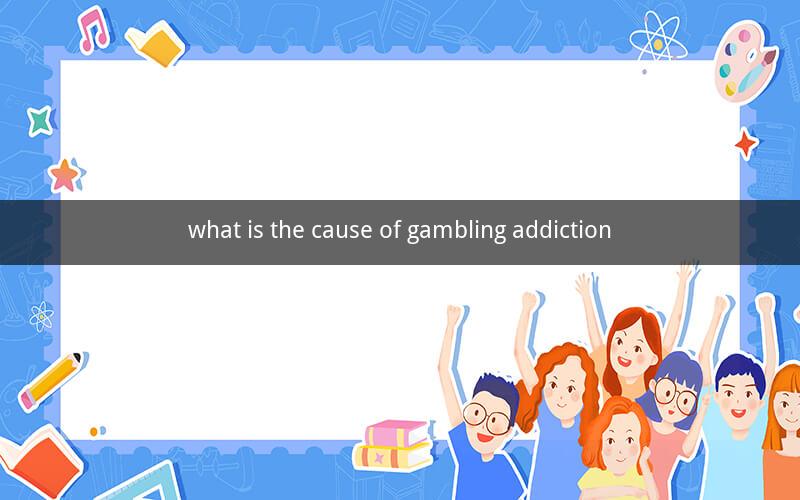
Directory
1. Introduction to Gambling Addiction
2. Psychological Factors
3. Environmental Influences
4. Genetic Predisposition
5. Societal and Cultural Factors
6. Developmental Trajectories
7. Treatment Approaches
8. Prevention Strategies
9. Conclusion
10. FAQs
1. Introduction to Gambling Addiction
Gambling addiction, also known as gambling disorder, is a chronic and progressive condition characterized by an inability to control the urge to gamble. This compulsion can lead to significant distress and impairment in various areas of a person's life. Understanding the causes of gambling addiction is crucial in developing effective prevention and treatment strategies.
2. Psychological Factors
Psychological factors play a significant role in the development of gambling addiction. Individuals who have a history of depression, anxiety, or other mood disorders may be more susceptible to the allure of gambling as a form of self-medication. Additionally, individuals with certain personality traits, such as impulsivity and sensation-seeking, may be more prone to developing gambling addiction.
3. Environmental Influences
Environmental factors can also contribute to the development of gambling addiction. Exposure to gambling activities through family, friends, or media can increase the likelihood of developing an addiction. Additionally, living in an area with a high density of gambling venues, such as casinos or racetracks, can create a conducive environment for gambling addiction.
4. Genetic Predisposition
Research suggests that genetics may play a role in the development of gambling addiction. Studies have identified specific genetic markers that may be associated with an increased risk of developing the disorder. However, it is important to note that genetics alone do not cause gambling addiction, as environmental and psychological factors also contribute to the disorder.
5. Societal and Cultural Factors
Societal and cultural factors can influence the prevalence and severity of gambling addiction. In some cultures, gambling is considered a socially acceptable activity, which may increase the risk of developing an addiction. Additionally, societal norms and values, such as the pursuit of wealth and materialism, can contribute to the development of gambling addiction.
6. Developmental Trajectories
The developmental trajectory of gambling addiction can vary among individuals. Some may develop an addiction quickly, while others may have a more gradual progression. Factors such as age of onset, the duration of gambling behavior, and the frequency of gambling activities can all contribute to the severity of the addiction.
7. Treatment Approaches
Treatment for gambling addiction can range from self-help strategies to professional interventions. Cognitive-behavioral therapy (CBT) is often used to help individuals develop coping skills and change negative thought patterns. Other treatment approaches may include medication, support groups, and inpatient or outpatient rehabilitation programs.
8. Prevention Strategies
Preventing gambling addiction involves a combination of individual, societal, and policy-level strategies. Education about the risks of gambling addiction can help individuals make informed decisions. Additionally, implementing regulations that limit access to gambling venues and promoting responsible gambling practices can contribute to the prevention of gambling addiction.
9. Conclusion
Gambling addiction is a complex condition influenced by a combination of psychological, environmental, genetic, and societal factors. Understanding the causes of gambling addiction is essential in developing effective prevention and treatment strategies. By addressing these underlying factors, we can work towards reducing the prevalence and impact of gambling addiction on individuals and society.
FAQs
1. What is the most common cause of gambling addiction?
- While no single cause can be identified, a combination of psychological, environmental, genetic, and societal factors contributes to the development of gambling addiction.
2. Can someone develop a gambling addiction without any previous mental health issues?
- Yes, individuals without a history of mental health issues can still develop gambling addiction, especially if they have certain risk factors or are exposed to gambling environments.
3. Is there a cure for gambling addiction?
- There is no definitive cure for gambling addiction, but effective treatment and support can help individuals manage their addiction and reduce its impact on their lives.
4. Can genetics predict whether someone will develop a gambling addiction?
- While genetics can play a role, they do not predict with certainty whether an individual will develop gambling addiction. Environmental and psychological factors also play significant roles.
5. Is it possible to prevent gambling addiction in children?
- Yes, education about the risks of gambling and promoting responsible gambling practices can help prevent gambling addiction in children and adolescents.
6. How does gambling addiction affect relationships?
- Gambling addiction can strain relationships with family and friends due to financial problems, lying, and other behaviors associated with the disorder.
7. Can medication be used to treat gambling addiction?
- While medication is not a primary treatment for gambling addiction, it may be used in conjunction with other interventions to address underlying psychological issues.
8. Are there any support groups available for individuals with gambling addiction?
- Yes, there are numerous support groups available, such as Gamblers Anonymous, which offer peer support and resources for individuals struggling with gambling addiction.
9. How can one recognize the signs of gambling addiction in themselves or a loved one?
- Signs include an increasing amount of time spent gambling, neglecting responsibilities, financial difficulties, and lying about gambling activities.
10. Can gambling addiction be prevented by avoiding gambling venues?
- While avoiding gambling venues can be a helpful strategy, it is not the only way to prevent gambling addiction. Addressing underlying risk factors and seeking support are also crucial.